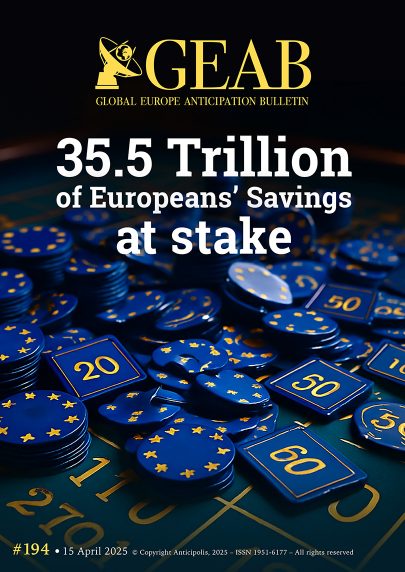GEAB 194

35,500 billion euros is the total amount of European savings. It’s also the level of US federal debt. In twenty years, that debt has gone from 5% to 123% of GDP, generating an interest burden of 881 billion dollars – or 100 million every hour!
Meanwhile, a tech bubble has masked the systemic cracks. Since 2010, the ‘Magnificent 7’ (Apple, Microsoft, Amazon, Alphabet, Meta, Tesla, Nvidia) have accounted for 40% of the US stock market’s performance, with a stock growth of over 27,000%!
Above-ground growth, disconnected from any real utility.
Need proof? Despite all this money, the mere arrival of Chinese competitor DeepSeek on the GenAI market caused a 17% plunge in Nvidia’s share price, alerting the financial world to the imminence of a bursting tech bubble[1] with potentially catastrophic consequences. Blaming tariffs alone for the storm currently sweeping through U.S. stock markets? A convenient excuse.
Is the stock market crash of 2025 a new global financial crisis? Probably not: just as the Euro-Russian war over Ukraine will not turn into a world war, the American financial crisis of 2025, despite Trump’s efforts to dress it up and extend it to the rest of the world via the “tariff war” narrative, will not, in our view, become a global financial crisis. The financial landscape is far more diversified than it was in 2008.
As a result, this big crash is taking on a certain virtuality. Billions are going up in smoke. But is it really money? Whose pockets was it in? How long before it reappears? And how can one make money from these fluctuations? The ups and downs of the stock market no longer really impress.
What matters now is no longer the state of Wall Street, but the state of our real economies.
According to Keir Starmer, “globalisation has failed”[2]. But the same can be said of finance which, despite its almost uninterrupted performance since 2008, is no longer able to enrich societies or prevent governments from going deeper into debt.
Like all systems, finance has drifted until it serves no one but itself: money makes money in order to make more money, mechanically investing in the top of the food chain, namely those Magnificent 7 who don’t even know what to do with it anymore. But who will use their glorious inventions if the economic soil is dried up?
Moreover, another revolution is on the horizon: digital currencies, cryptocurrencies, automation, AI… all pointing to the end of finance as we know it[3].
Let the numbers blow in the financial wind! Out of the ruins of the old system, humankind, assisted by AI and digital currencies, could now shape a new financial paradigm — one that serves the real economy… in test & trial mode.

Marie-Hélène Caillol, Managing editor
To access the full issue, please log in or register here
______________

Europe has long benefited from a powerful economic engine: the household savings. Built up over decades, this financial cushion, estimated at 35.5 trillion euros (against 14 trillion public debt), has [...]
Stock markets are reeling in the wake of Donald Trump's thunderous announcements. Is the US ruled by an erratic and reckless leader? Or are we witnessing the emancipation of politics [...]
At the crossroads of a Russian past, an American present and a European future, Ukraine, which for the last 3 years has been a testing ground for the wars of [...]
The dread of the climate crisis could soon be replaced by that of a "global seismic crisis", i.e. a gradual increase in the number and severity of earthquakes. If we [...]
After almost 20 years of anticipating the collapse of the Western-centric system, the GEAB now feels it has a duty to continue to identify the crises in the making, but [...]
As in every stock market crisis, stocks will change hands. Insofar as the crisis is largely provoked, it is likely that state structures - starting with the United States - [...]

Comments